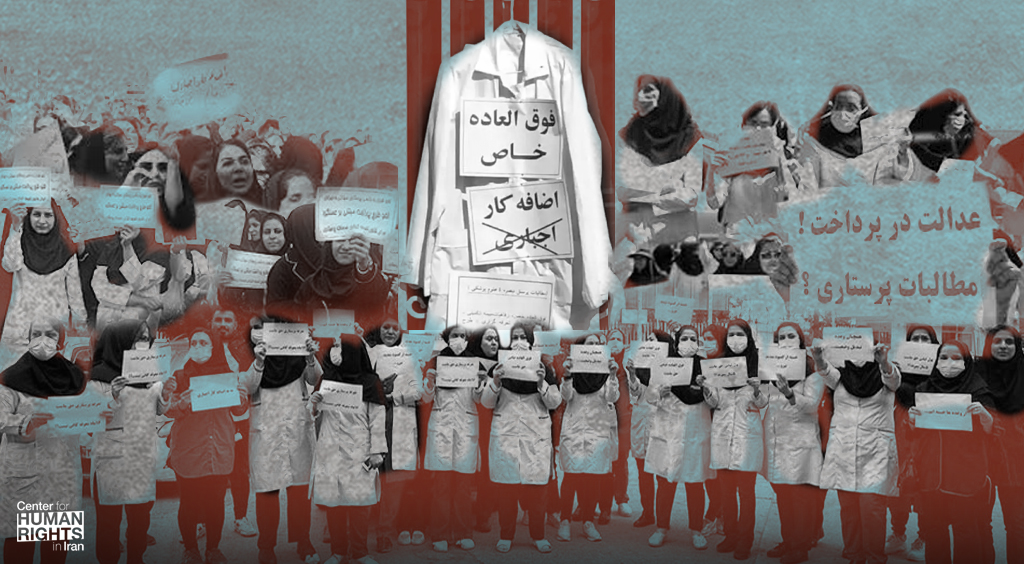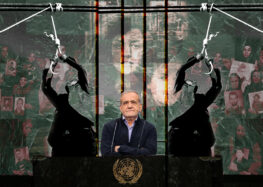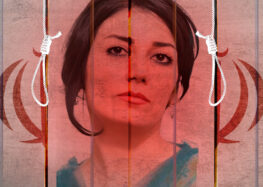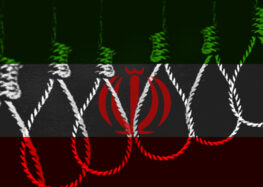Nurses’ Strikes Escalate Across Iran as Authorities Intensify Repression
 Peaceful Protests for Fair Wages and Improved Working Conditions Met with Arbitrary Arrests
Peaceful Protests for Fair Wages and Improved Working Conditions Met with Arbitrary Arrests
August 28, 2024 – As nurses’ strikes surge across Iran, the Center for Human Rights in Iran (CHRI) demands that authorities respect the rights of these essential healthcare workers to peacefully protest and immediately cease violent crackdowns.
“For years, Iran’s predominantly female nursing workforce has been systematically exploited and silenced,” said Hadi Ghaemi, executive director of CHRI.
“Without the freedom to form independent unions, these workers face severe government retaliation for simply demanding what is rightfully theirs—fair wages and safe working conditions,” he added.
“The international community cannot remain silent,” said Ghaemi. “It must hold the authorities accountable for their blatant violations of the right to peaceful protest and stand in solidarity with Iran’s healthcare workers.”
The protests erupted following the death of Parvaneh Mandani, a 32-year-old nurse from Fars Province, on August 2. Believed to have died from overwork, Mandani’s death has become a rallying cry for nurses across the country.
Nurses Refusing to Back Down Despite Violent Repression
“Many nurses and medical staff had gathered at the [name of hospital withheld] to protest and chant slogans when suddenly some plainclothes individuals from an unknown organization attacked and violently dispersed the nurses,” a medical worker who joined a protest in Mashhad, Iran’s second largest city, on August 17, told CHRI.
“The protesting nurses stood in front of the attackers and prevented the confrontation from escalating,” she said on condition of anonymity. “The hospital officials addressed the nurses in a threatening tone, saying that if they continued to protest and strike, all the contract nurses and staff would be fired.”
“The intensity of the protests has decreased in Mashhad’s big hospitals, as officials have dissuaded some nurses and medical staff members from protesting by making promises, but everyone knows that if the crisis continues, the protests will resume,” she added.
Nurses Protest Harsh Working Conditions and Inadequate Pay
Nurses in Iran are subjected to grueling working conditions, including excessive hours and inadequate staffing, which, coupled with low wages and lack of adequate support from the government, contribute to immense physical and mental strain. Some overworked nurses have reportedly died by suicide as a result.
The protests began in the city of Karaj, in Alborz province, west of Tehran, and have quickly spread across the country.
As of August 27, strikes and demonstrations have been reported in major cities including Tehran, Karaj, Shiraz, Mashhad, Tabriz, Isfahan, Rasht, Yazd, Kermanshah, Ahvaz, Arak, Bandar Abbas, Nishapur, Bushehr, Gorgan, Ilam, Marivan, and Dehdasht.
Violent Repression
On August 27, videos surfaced online showing Islamic Republic police repressing the ongoing peaceful protests.
In Bushehr, police violently dispersed emergency medical response workers who had joined nurses at a protest demanding higher wages. A strong police presence was also reported at demonstrations in Tehran.
Nurses chanted slogans including, “Enough promises, we don’t have any food,” “Nurses, shout for your rights,” and “Don’t be afraid, we are all in this together!”
The exact number of arbitrary arrests remains elusive. The victims include Pouya Esfandiari, a Kurdish nurse from Divandareh, Kurdistan Province, working at the Milad Hospital in Tehran, who was arrested by Iranian security forces on August 20 and taken to an undisclosed location, according to the Hengaw human rights organization.
Zahra Tamandon, a head nurse at Masih Daneshvari Hospital in Tehran, was taken into custody on August 21, along with several other nurses whose identities remain unconfirmed. Tamandon was released three days later.
Two nurses were detained in Arak on August 24, and another was arrested in Isfahan on August 26.
No additional details about these cases have been released.
Nurses Demand Fair Wages and Better Working Conditions
Nurses across Iran have made a series of critical demands in their ongoing strikes, highlighting the urgent need for systemic reforms in the healthcare sector. Among their most consequential demands is an increase in salaries to at least 30 million tomans (approximately $505 USD), aligning with the inflation rate, and for their official minimum income to be above the poverty line.
Nurses are also demanding the proper enforcement of regulations governing nursing services and the removal of responsibilities that go beyond their job descriptions. Additionally, they insist that overtime work be voluntary, limited to 80 hours per month, and that the current overtime pay—currently less than 25,000 tomans (less than 50 cents) per hour—be significantly increased.
Furthermore, they are advocating for the rehiring of nurses who were unjustly dismissed following the COVID-19 epidemic.
“These demands reflect the nurses’ broader struggle for fair wages, better working conditions, and a healthcare system that truly supports both its workers and the patients they serve,” said Ghaemi.
Iranian Labor Groups Stand in Solidarity with Nurses
In a statement of solidarity, the Coordinating Council of the Iranian Teachers Trade Associations expressed support: “We hope our dear nurses will reach their demands through unity and collective activism… What unites us, Iranian educators, with you, the nurses of the country, is a common pain. Consider us your sympathizers.”
The Labor Union Organization Assistance Coordination Committee, the Khuzestan Province Pensioners Alliance, and the Haft Tappeh sugar plant workers are among other domestic labor groups that have expressed support for the protesting nurses.
The three groups issued a joint statement on August 26, stating, “Workers, teachers, and pensioners have been struggling to realize many of the same demands as nurses concerning cost of living, wages and welfare benefits.”
“Until the conditions and salary terms of these hardworking people are improved, the health system, which has already been commercialized, will cause more and more people to face the abyss of death and destruction,” they said.
Iran’s Violations of its Domestic and International Obligations
Despite the Islamic Republic’s Constitution guaranteeing the right to form “professional associations,” neither it nor the Labor Law recognizes the right to strike by refusing to work or to form independent unions.
Iran’s government does not recognize independent unions, imprisons their leaders under sham national security charges, and routinely arrests individuals peacefully protesting labor conditions—all practices that violate the International Labor Organization’s (ILO) Fundamental Principles, to which Iran is a signatory.
Although Iran became a founding member of the ILO in 1919, it has not ratified all the ILO’s core conventions, particularly those related to the right to form independent unions and collective bargaining. *These include:
- ILO Convention No. 87, Freedom of Association and Protection of the Right to Organize Convention, which guarantees workers’ rights to form and join trade unions of their choice without interference from authorities.
- ILO Convention No. 98, Right to Organize and Collective Bargaining Convention, which protects workers’ rights to organize and engage in collective bargaining with employers.
The Islamic Republic is also in severe violation of the International Covenant on Civil and Political Rights (ICCPR) and the International Covenant on Economic, Social, and Cultural Rights (ICESCR), both of which protect the rights to protest and form independent unions.
The Nursing Tariffs Law, which mandates that nurses’ pay be determined by workload and performance, has remained unimplemented since its passage in 2006.
Similarly, the Civil Service Management Law allocates state resources for bonuses to workers performing under special conditions, such as during epidemics or in extreme climates. Despite nurses’ demands for this provision to be enforced during the COVID-19 pandemic, authorities ignored their requests.
Key provisions of the 2009 Productivity Promotion Law, which requires the government to maintain adequate staffing levels in the health system, have also gone unimplemented.
The Ministry of Health has not hired new personnel for years, leaving public hospitals critically understaffed and nurses overwhelmed.
“Despite being bound by both domestic laws and international conventions to protect workers’ rights, the Islamic Republic has repeatedly violated these obligations in practice,” said Ghaemi.
“This relentless suppression is driven by decades of impunity and the international community’s failure to hold Iran accountable for its widespread human rights abuses,” he added.
*Editor’s Note, on August 29, 2024: These are core conventions that are binding on all ILO members, regardless of ratification.
This report was made possible from donations by readers like you. Help us continue our mission by making a tax-deductible donation.






